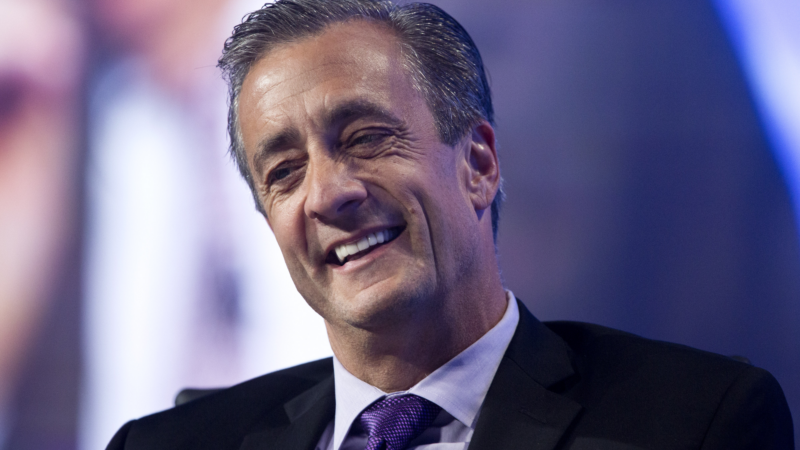David Steiner of FedEx is tapped to be the U.S. Postal Service’s new leader
David Steiner will lead the U.S. Postal Service as the next postmaster general, as the federal mail agency faces an uncertain future under the Trump administration.
Amber McReynolds, chair of the USPS Board of Governors, announced the board’s appointment at an open session of a board meeting Friday. She said Steiner is set to start in July.
Steiner, a former Waste Management CEO, has served on the board of FedEx, a top USPS competitor that had collaborated with the Postal Service for “last-mile” package deliveries in hard-to-reach rural areas and on air transportation. Those partnerships, however, have ended in recent years.
Steiner is now preparing to take the helm of a beleaguered government agency that millions around the U.S. rely on for sending and receiving medication, payments, ballots and other mail.
The board’s appointment comes amid concerns that Trump officials remain determined to exert more control over an agency that Congress established to be independent decades ago.
After Commerce Secretary Howard Lutnick’s swearing-in ceremony in February, President Trump suggested a “form of a merger” between the Commerce Department and the Postal Service, sparking a series of protests organized by USPS employee unions.
Trump has also announced plans to nominate Anthony Lomangino, a Republican donor, to join the USPS governing board, which currently has four postal governors nominated by former President Joe Biden and one Trump-nominated governor who is set to leave by December. With four current vacancies, Trump has an opportunity to dominate the board with more of his own nominees. (A full board consists of nine governors, plus the postmaster general and deputy postmaster general.)
In a USPS release announcing his position, Steiner said, “I deeply admire the public service and business mission of this amazing institution, and I believe strongly in maintaining its role as an independent establishment of the executive branch.”
The appointment already has some critics, though.
In response to a Washington Post report on the board’s plans to appoint FedEx’s Steiner with Trump’s support, Rep. Gerry Connolly of Virginia, the top Democrat on the House Oversight Committee, said in a statement that the move is “a blatant conflict of interest and an attempt by President Trump to install a handpicked loyalist who he believes will put his interests over what may be best for the Postal Service and the American people.”
Brian Renfroe, president of the National Association of Letter Carriers, the union representing carriers in cities, also opposes Steiner’s appointment.
“His selection isn’t just a conflict of interest—it’s an aggressive step toward handing America’s mail system over to corporate interests,” Renfroe said in a statement. “Private shippers have been waiting to get USPS out of parcel delivery for years. Steiner’s selection is an open invitation to do just that.”
At the National Rural Letter Carriers’ Association, President Don Maston says in a statement that the union is “ready to work” with Steiner.
“But we will be watching closely, especially since Mr. Steiner currently sits on the board of directors of FedEx, one of the Postal Service’s largely and aggressively non-union competitors,” Maston added. “The stakes—for rural communities, for working families, and for the future of our cherished public Postal Service—could not be higher.”
Congress set up USPS, previously a cabinet-level agency, to be independent of the White House through the Postal Reorganization Act of 1970. The mail service has since been run by a politically appointed board of governors, which has the authority under federal law to appoint and remove the postmaster general.
Louis DeJoy stepped down from that top post in March, while USPS continues to carry out a 10-year reorganization plan he established in 2021. His resignation came shortly after entering USPS into an agreement that allows the DOGE team of Trump’s billionaire adviser Elon Musk to help find “further efficiencies” at USPS.
Since 1982, the agency has generally received no tax dollars to fund its operations, relying instead on stamp sales and other service fees. While it posted a surplus in this fiscal year’s first quarter, it posted a net loss of $3.3 billion in the second quarter, Luke Grossmann, USPS chief financial officer, said at the open session of the governing board meeting on Friday. The mail service has been struggling to balance its books for years, losing $9.5 billion last year.
As president, Trump has been a vocal critic of the Postal Service’s finances since his first administration, when USPS also became entangled in his unfounded claims of widespread fraud involving mail-in voting.
At a December press conference, Trump said that privatizing the USPS was “not the worst idea” he’s ever heard. Such a move would likely further reduce mail service in rural communities and faces bipartisan opposition among members of Congress.
Editor’s note: USPS is a financial supporter of NPR.
Edited by Benjamin Swasey
U.S. unexpectedly adds 130,000 jobs in January after a weak 2025
U.S. employers added 130,000 jobs in January as the unemployment rate dipped to 4.3% from 4.4% in December. Annual revisions show that job growth last year was far weaker than initially reported.
Greetings from Mexico City’s iconic boulevard, where a dog on a bike steals the show
Every week, more than 100,000 people ride bikes, skates and rollerblades past some of the best-known parts of Mexico's capital. And sometimes their dogs join them too.
February may be short on days — but it boasts a long list of new books
The shortest month of the year is packed with highly anticipated new releases, including books from Michael Pollan, Tayari Jones and the late Nobel laureate Mario Vargas Llosa.
Shootings at school and home in British Columbia, Canada, leave 10 dead
A shooting at a school in British Columbia left seven people dead, while two more were found dead at a nearby home, authorities said. A woman who police believe to be the shooter also was killed.
Trump’s EPA plans to end a key climate pollution regulation
The Environmental Protection Agency is eliminating a Clean Air Act finding from 2009 that is the basis for much of the federal government's actions to rein in climate change.
The U.S. claims China is conducting secret nuclear tests. Here’s what that means
The allegations were leveled by U.S. officials late last week. Arms control experts worry that norms against nuclear testing are unraveling.







